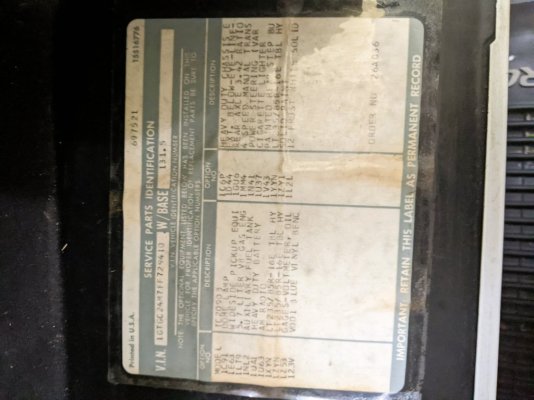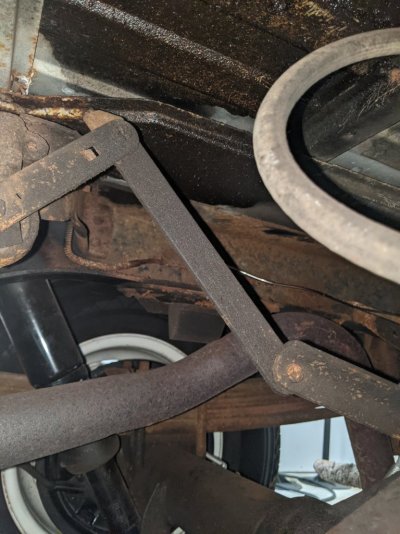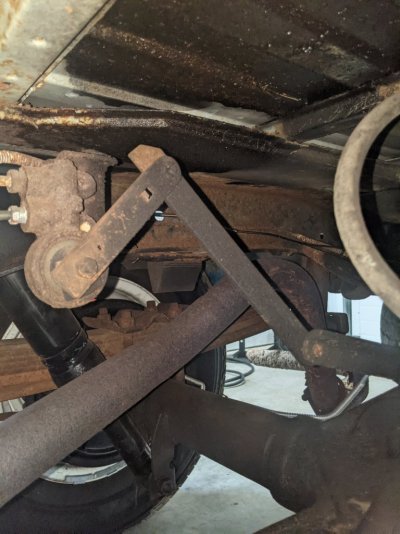paul8369
Junior Member
- Joined
- Sep 29, 2023
- Posts
- 3
- Reaction score
- 3
- Location
- Powhatan, VA
- First Name
- Paul
- Truck Year
- 1985
- Truck Model
- c2500
- Engine Size
- 350
Hello, I have a braking problem with my ’85 C2500. I recently pulled a trailer loaded with about 2 cubic yards of dirt. The truck did not have any issues pulling the trailer and for most of the trip home it braked just fine. Just prior to arriving I put the brakes on at 25 mph and the front brakes instantly locked up. It felt like the truck had no rear brakes at all. The brake light did not come on during this hair-raising event.
Unloaded, the brakes are just fine. Hauling a few hundred pounds in the bed is good too.
I have a new master cylinder, calipers, pads, front hubs, rear shoes, rear hardware and new hoses. I believe my problem is the load sensing proportioning valve (LSPV) on the rear brakes because this event seems related to the amount of rear spring deflection (heavily loaded, no brakes – lightly loaded good brakes). There is a difference in spring deflection of a couple of inches between pulling the trailer and unloaded.
From what I can gather, the LSPV should apply more braking force to the rear brakes as the load increases but it felt like just the opposite.
Comparing my LSPV configuration to the couple I have found on the internet, it appears to be correctly installed and timed (see attached pictures).
I have also looked at GM TSB 88-T-151. This appears to recommend removing the valve for lifted or modified trucks and does not require changing the main proportioning valve or installing a different lspv.
For what it is worth, I have the 8,600 lb gvw suspension (see picture). Currently, the truck has the front brakes for the JB7 big brakes, including the master cylinder. However, somewhere in the past, it appears the rear axle was changed but they used the 11” brakes already installed on the axle and did not install the original 13” brakes. I know that the smaller brakes have less braking force and are mis-matched with the existing proportioning valve/master cylinder but that should not cause my problem.
I am looking for some ideas on how to address this issue. I have seen some who discard the LSPV with good results and others who end up with very sensitive rear brakes.
Thanks for the help.
Unloaded, the brakes are just fine. Hauling a few hundred pounds in the bed is good too.
I have a new master cylinder, calipers, pads, front hubs, rear shoes, rear hardware and new hoses. I believe my problem is the load sensing proportioning valve (LSPV) on the rear brakes because this event seems related to the amount of rear spring deflection (heavily loaded, no brakes – lightly loaded good brakes). There is a difference in spring deflection of a couple of inches between pulling the trailer and unloaded.
From what I can gather, the LSPV should apply more braking force to the rear brakes as the load increases but it felt like just the opposite.
Comparing my LSPV configuration to the couple I have found on the internet, it appears to be correctly installed and timed (see attached pictures).
I have also looked at GM TSB 88-T-151. This appears to recommend removing the valve for lifted or modified trucks and does not require changing the main proportioning valve or installing a different lspv.
For what it is worth, I have the 8,600 lb gvw suspension (see picture). Currently, the truck has the front brakes for the JB7 big brakes, including the master cylinder. However, somewhere in the past, it appears the rear axle was changed but they used the 11” brakes already installed on the axle and did not install the original 13” brakes. I know that the smaller brakes have less braking force and are mis-matched with the existing proportioning valve/master cylinder but that should not cause my problem.
I am looking for some ideas on how to address this issue. I have seen some who discard the LSPV with good results and others who end up with very sensitive rear brakes.
Thanks for the help.




